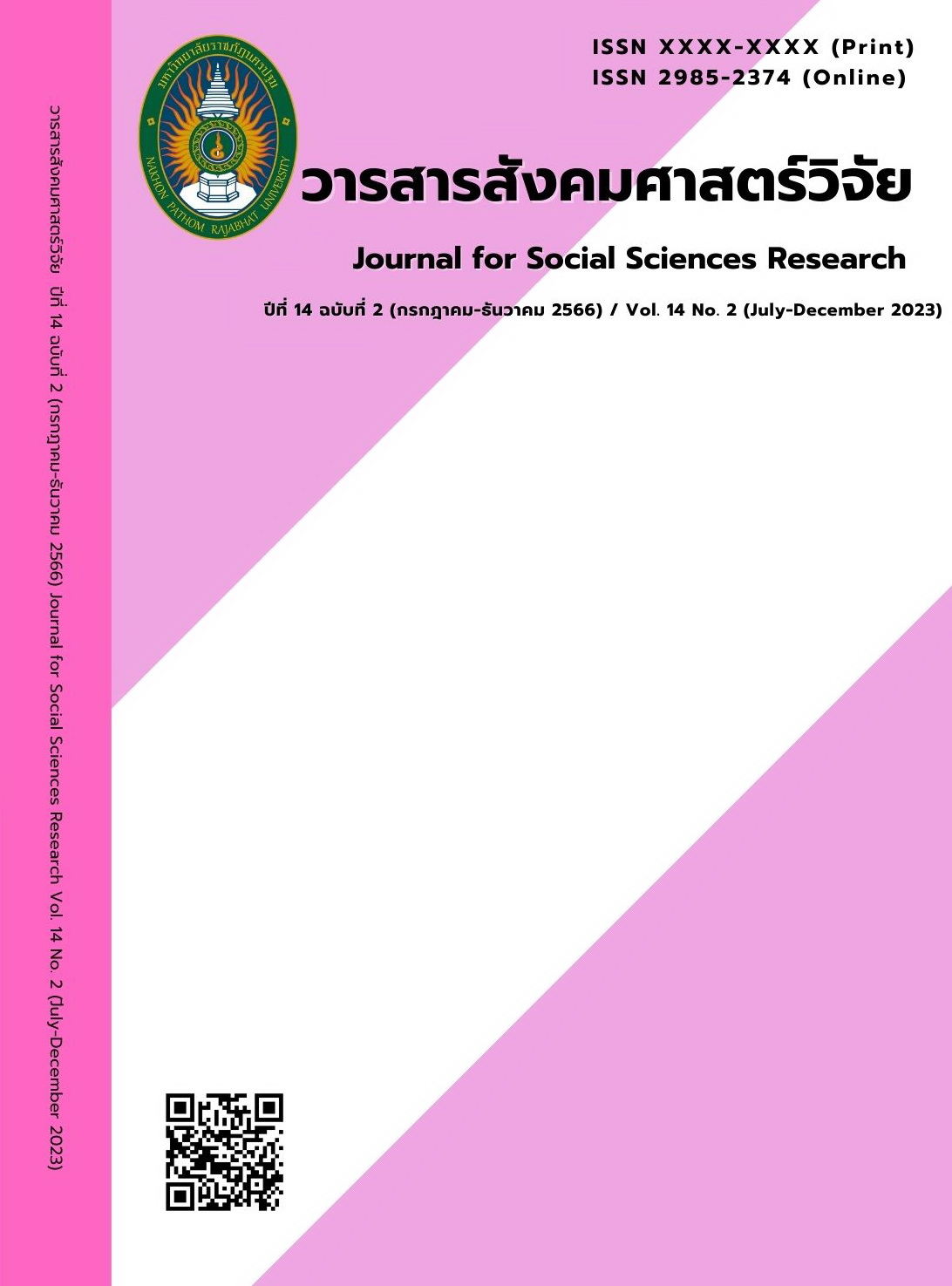THE EFFECTIVENESS OF A LEARNING MANAGEMENT MODEL TO ENHANCE GOOD CITIZENSHIP CHARACTERISTICS ON A SOCIAL-SERVICE BASED INSTRUCTIONAL CONCEPTS FOR UNDERGRADUATE STUDENTS
Main Article Content
Abstract
This research aimed to: 1) develop a learning management model to enhance good citizenship characteristics based on a social-service based instructional concept; and 2) study the effectiveness of a learning management model to enhance good citizenship characteristics on a social-service based instructional concepts for Undergraduate Students. This study is a quasi-experimental research. The samples, selected by multi-stage random sampling method,
consisted of 30 second-year undergraduate students of the Faculty of Music and Drama. The instruments used in this research were 1) a learning management model, 2) 9 learning activity management plans based on the learning management model to enhance good citizenship characteristics, which all components were appropriate and consistent, 3) a good citizenship characteristics assessment form, and 4) a social service-based activity assessment form with the index of congruence value between 0.80-1.00. The statistics used to analyze the data included mean, standard derivation, and one–way repeated measures ANOVA.
The research results showed that: 1) the learning management model to enhance good citizenship characteristics based on a social-service based instructional concepts comprised 5 elements: 1.1) principles, 1.2) objectives, 1.3) contents, 1.4) instructional procedure, consisting of 4 steps—step 1: preparation, 2: operation, 3: knowledge construction and application in real situation, and step 4: work evaluation, and 1.5) measurement and evaluation. Overall, the learning management model was evaluated at the highest level ( = 4.89, S.D. = 0.18). 2) The effectiveness of the learning management model to enhance good citizenship characteristics based on a social-service based instructional concepts revealed that in each stage students improved the good citizenship characteristics in 3 aspects—self-responsibility, cooperation, and social responsibility—at a significant level of .05.
Article Details

This work is licensed under a Creative Commons Attribution-NonCommercial-NoDerivatives 4.0 International License.
บทความที่ได้รับการตีพิมพ์เป็นลิขสิทธิ์ของมหาวิทยาลัยราชภัฏนครปฐม
เนื้อหาของแต่ละบทความเป็นทัศนะของผู้เขียน ซึ่งที่ปรึกษา บรรณาธิการ กองบรรณาธิการ และคณะกรรมการบริหารวารสารไม่จำเป็นต้องเห็นด้วย หรือร่วมรับผิดชอบใดๆ
References
ดวงพร ภาคนิ่มนวล. (2564). การพัฒนารูปแบบการจัดการเรียนรู้ด้วยเทคนิคเกมมิฟิเคชันเรื่อง เศรษฐกิจพอเพียงเพื่อเสริมสร้างทักษะการแก้ปัญหาสำหรับนักเรียนชั้นประถมศึกษาปีที่ 5. วิทยานิพนธ์ครุศาสตรมหาบัณฑิต สาขาวิชาหลักสูตรและการสอน บัณฑิตวิทยาลัย มหาวิทยาลัยราชภัฏรำไพพรรณี.
ทิศนา แขมมณี. (2553). ศาสตร์การสอน: องค์ความรู้เพื่อการจัดกระบวนการเรียนรู้ที่มีประสิทธิภาพ (พิมพ์ครั้งที่ 12). กรุงเทพฯ: สำนักพิมพ์แห่งจุฬาลงกรณ์มหาวิทยาลัย.
บุปผชาติ ทัฬหิกรณ์. (2552). การประยุกต์ใช้เทคโนโลยีสารสนเทศในการเรียนการสอน. กรุงเทพฯ: โครงการเทคโนโลยีสารสนเทศตามพระราชดำริ สมเด็จพระเทพรัตนราชสุดาฯ สยามบรมราชกุมารี ศูนย์เทคโนโลยีอิเล็กทรอนิกส์และคอมพิวเตอร์แห่งชาติ.
ปาริชาติ ประเสริฐสังข์. (2556). การพัฒนารูปแบบการเรียนการสอนโดยการบริการสังคมสำหรับนักศึกษาวิชาชีพครู. วิทยานิพนธ์ปรัชญาดุษฎีบัณฑิต สาขาวิชานวัตกรรมหลักสูตรและการเรียนรู้ บัณฑิตวิทยาลัย มหาวิทยาลัยมหาสารคาม.
วรภัทร์ ภู่เจริญ. (2552). Learning organization & knowledge management (พิมพ์ครั้งที่ 2). กรุงเทพฯ: อริยชน.
ศักดิ์ชัย นิรัญทวี. (2548). รายงานการวิจัยเรื่อง การจัดการเรียนรู้เพื่อพัฒนาผู้เรียนให้เป็นพลเมืองดี. กรุงเทพฯ: พิมพ์ดีการพิมพ์.
สกุลการ สังข์ทอง. (2562). การพัฒนารูปแบบการจัดการเรียนรู้แบบ MECCA เพื่อเสริมสร้างความสามารถในการอ่านอย่างมีวิจารณญาณสำหรับนักเรียนชั้นมัธยมศึกษาตอนปลาย. วิทยานิพนธ์ปรัชญาดุษฎีบัณฑิต สาขาวิชาหลักสูตรและการสอน (การสอนภาษาไทย) บัณฑิตวิทยาลัย มหาวิทยาลัยศิลปากร.
สหัทยา พลปัถพี. (2548). การนำเสนอแนวทางการพัฒนาคนให้มีคุณลักษณะตามปรัชญาของเศรษฐกิจพอเพียง. กรุงเทพฯ: จุฬาลงกรณ์มหาวิทยาลัย.
สำนักงานเลขาธิการสภาการศึกษา กระทรวงศึกษาธิการ. (2560). แผนการศึกษาแห่งชาติ พ.ศ.2560-2579. กรุงเทพฯ: พริกหวานกราฟฟิก.
Anderson, T. P. (1997). Using models of instruction. In C. R. Dills & A. J. Romiszowski, Eds. Instructional development paradigms. Englewood Cliffs, NJ: Educational Technology Publications.
Arends, R. I. (1999). Classroom instruction and management. New York: McGraw Hill.
Eyler, J. & Giles, D. E. (1999). Where’s the learning in service learning?. California: Jossey-Bass Publisher.
Joyce, B. & Weil, M. (2000). Model of teaching. Englewood Cliffs, NJ: Prentice-Hall.
Power, A. (2010). Community engagement as authentic learning with reflection. Education Research, 20 (1), 57-63.
Torney-Purta, J. & Wilkenfeld, B. S. (2009). Paths to 21st century competencies through civic education classrooms. Chicago, IL: American Bar Association Division for Public Education.


